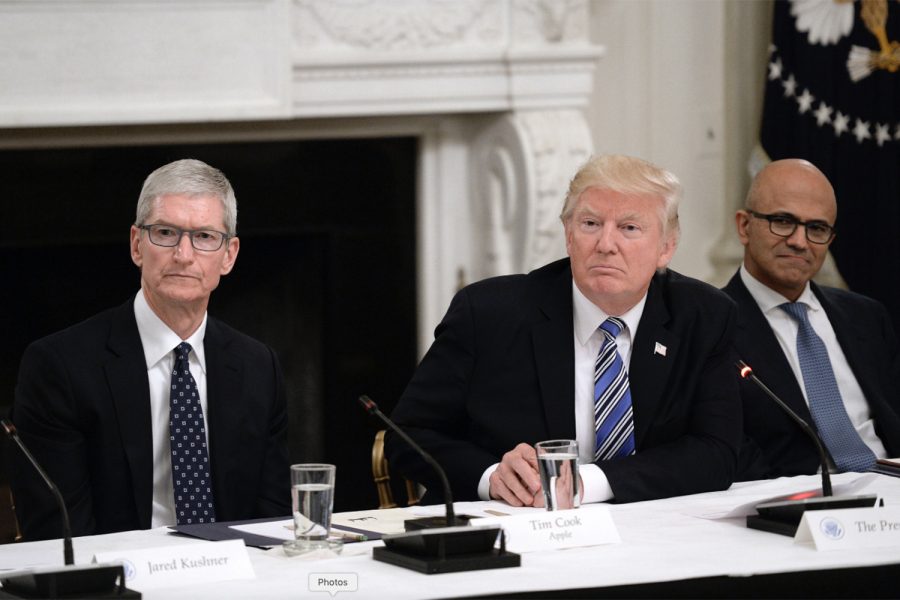The President’s impact
A reflection of the first two years with President Trump
January 9, 2019
In his two years as president, Donald Trump has torn at the fabric of America’s core ideology, making citizens wonder what it means to be an American. He has tugged at the thread that has spun decades of foreign relationships and the idea of the U.S. as global pioneer of culture and politics.
The Trump administration began as a joke. Leftists and mainstream media predicted epic failure in the polls and concession after the first debate. Trump surprised the nation with his hard-line Republican platform: unconditional support of the Second Amendment, conservative economics and radical immigration reform. One-by-one, candidates started dropping out of the presidential election, leaving only a few contenders left in the race for the coveted oval office.
Economy:
Regardless of political party or belief, the growth of the economy cannot be ignored.
Under Trump’s historic tax cuts and trade regulations, business are thriving and consumer confidence is at a 17-year high. Through his institution of the Keystone XL pipeline, cutting regulation and opening federal lands for potential energy reserves, Trump has given way for an expanding economy.
Trump’s support and election can be directly linked to concerns of the public toward the American economy. A poll by Pew Research in 2016 revealed that 84 percent of voters said the economy was a “top issue” for them when considering who to vote for president.
The unemployment rate is at it lowest in 50 years, with only 3.9 percent unemployed and more than 3.5 million jobs having been created. The economy saw 4.2 percent growth over the last quarter. American families received $3.2 trillion in gross tax cuts and saw child tax credit double, which go to benefit middle and lower class families.
Many of Trump’s financial strategies have sparked controversy, but none more so than his repealing of Obamacare’s individual mandate, which required most Americans to have a basic level of health insurance coverage. Obama saw it as diversifying the medical market rather than just being reliant on the sick to buy insurance. This helps premiums go down and facilitates market stability. Trump, however, saw the mandate as taxing to US citizens who cannot afford to buy healthcare.
Society and Politics:
Though the economy is thriving, the social well-being of the country is contested. Trump’s impulsive and combative character often leads to conflict with the media and Democrats. His “modern day presidential” administration of Twitter diplomacy, continued practice of unscripted and unchecked rally speeches, and unwillingness to conform to honoured practices of politics have frequently caused backlash within the political sphere.
Similarly to Trump’s economics, the application of Trump social policies are debated. One of Trump’s lines in his political platform is his unrelenting support of the Second Amendment. He has been vocal about citizens’ rights to own guns, and has even been an avid supporter to the NRA, the National Rifle Association.
Trump’s administration has been plagued with gun violence. Trump’s first year in office, concluded in a total of 112 people dead in 10 different mass shootings. Some of the most notable of these being the Las Vegas attack on October 1, 2017 which claimed 58 lives and injured over 800 and the school shooting in Parkland, Florida that killed 17 and injured an additional 17.
Public outrage and frustration towards Trump’s pro-gun policies and lack of action to address mass shootings and gun violence by the Republican-dominated legislature dominate today’s society, namely in the media. Survivors and concerned citizens have taken to forming organizations, such as Never Again MSD, to demand legislative action unbestowed to them under the Trump administration.
Another issue worrying the public with concerns to Trump’s America is the issues of gender inequality and sexual assault. Since the infamous Access Hollywood tapes revealed during his campaign, women’s’ rights have been on the forefront of social issues. The Women’s March was held the day after Trump’s inauguration to protest such tapes, foreshadowing the #metoo movement that still currently dominates our society.
Gender tensions increased with Trump’s nomination of Brett Kavanaugh. Kavanaugh, lawyer and jurist, was accused by Palo Alto University Professor of Psychology Christine Blasey Ford of sexually assaulting her in the 1980s. Two other women later came forward, and Kavanaugh was subjugated to a Senate Judiciary Committee hearing, in which all allegations were found unsubstantiated. Trump remained steadfast and supportive of Kavanaugh during the entire ordeal, causing distance from the female public.
Donald Trump’s administration has been filled with controversy. Though his economic policies have greatly benefited the country, the society can be interpreted as stratified. His administration has changed the perception of what a modern presidency looks like, now dominated by social media and online rhetoric.















